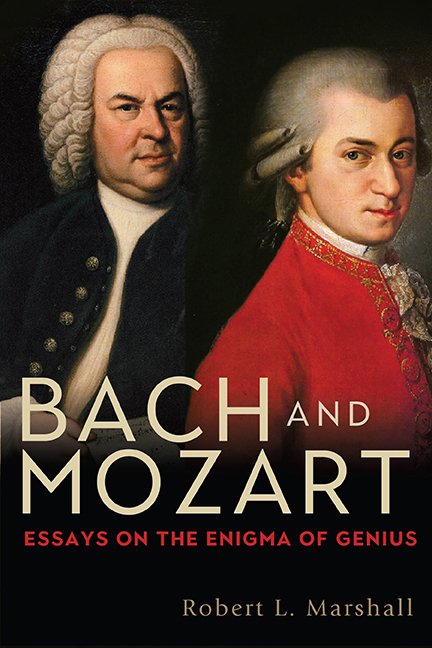Book contents
- Frontmatter
- Dedication
- Epigraph
- Contents
- List of Figures
- Preface
- List of Abbreviations
- Prologue. The Century of Bach and Mozart as a Music-Historical Epoch: A Different Argument for the Proposition
- 1 Young Man Bach: Toward a Twenty-First-Century Bach Biography
- 2 The Notebooks for Wilhelm Friedemann and Anna Magdalena Bach: Some Biographical Lessons
- 3 Bach and Luther
- 4 Redeeming the St. John Passion–and J. S. Bach
- 5 Bach's Keyboard Music
- 6 The Minimalist and Traditionalist Approaches to Performing Bach's Choral Music: Some Further Thoughts
- 7 Truth and Beauty: J. S. Bach at the Crossroads of Cultural History
- 8 Bach at Mid-Life: The Christmas Oratorio and the Search for New Paths
- 9 Bach at the Boundaries of Music History: Preliminary Reflections on the B-Minor Mass and the Late-Style Paradigm
- 10 Father and Sons: Confronting a Uniquely Daunting Paternal Legacy
- 11 Johann Christian Bach and Eros
- 12 Bach and Mozart: Styles of Musical Genius
- 13 Mozart and Amadeus
- 14 Bach and Mozart's Artistic Maturity
- 15 Mozart's Unfinished: Some Lessons of the Fragments
- Epilogue (ossia Postmortem). Had Mozart Lived Longer: Some Cautious (and Incautious) Speculations
- Notes
- Works Cited
- Index
- Miscellaneous Endmatter
- Eastman Studies in Music
Epilogue (ossia Postmortem). Had Mozart Lived Longer: Some Cautious (and Incautious) Speculations
Published online by Cambridge University Press: 29 March 2020
- Frontmatter
- Dedication
- Epigraph
- Contents
- List of Figures
- Preface
- List of Abbreviations
- Prologue. The Century of Bach and Mozart as a Music-Historical Epoch: A Different Argument for the Proposition
- 1 Young Man Bach: Toward a Twenty-First-Century Bach Biography
- 2 The Notebooks for Wilhelm Friedemann and Anna Magdalena Bach: Some Biographical Lessons
- 3 Bach and Luther
- 4 Redeeming the St. John Passion–and J. S. Bach
- 5 Bach's Keyboard Music
- 6 The Minimalist and Traditionalist Approaches to Performing Bach's Choral Music: Some Further Thoughts
- 7 Truth and Beauty: J. S. Bach at the Crossroads of Cultural History
- 8 Bach at Mid-Life: The Christmas Oratorio and the Search for New Paths
- 9 Bach at the Boundaries of Music History: Preliminary Reflections on the B-Minor Mass and the Late-Style Paradigm
- 10 Father and Sons: Confronting a Uniquely Daunting Paternal Legacy
- 11 Johann Christian Bach and Eros
- 12 Bach and Mozart: Styles of Musical Genius
- 13 Mozart and Amadeus
- 14 Bach and Mozart's Artistic Maturity
- 15 Mozart's Unfinished: Some Lessons of the Fragments
- Epilogue (ossia Postmortem). Had Mozart Lived Longer: Some Cautious (and Incautious) Speculations
- Notes
- Works Cited
- Index
- Miscellaneous Endmatter
- Eastman Studies in Music
Summary
When Mozart died at 12:55 on the morning of December 5, 1791, the score of the Requiem lay unfinished on his desk. In addition, the torsos of over 150 further unfinished works were scattered in his Vienna apartment. Some were the briefest jottings; others represented substantial portions of incipient masterpieces. Among them one finds virtually every musical genre of the late eighteenth century: composi-tions for the church, German and Italian operas, concert arias, Lieder, symphonies, chamber music, concertos, sonatas, and pieces for a colorful variety of instrumental combinations and soloists. Many of these works would certainly have been com-pleted had Mozart lived longer.
Mozart's remarkably long list of unfinished works reflects the poignant fact that his life itself was unfinished—cut off at the height of his powers at the age of not quite thirty-six. It is hard to disagree with the common view that Mozart's early death was probably the most tragic single event in the history of music. And it is understandable that music lovers in their more morbid and whimsical moments wonder: What if he had lived longer? For obvious reasons scholars and biographers are less likely to permit themselves to entertain speculations on a question of this kind. But what if one were to take the question seriously for a moment? Doing so not only has its idle fascination but also its share of surprises and ironies.
To get things started, let us first consider another intriguing hypothetical proposi-tion—in fact the exact converse of our chosen question—namely, what if Mozart had died even earlier, say, when he was Franz Schubert's age? Here there is no need for speculation. Franz Schubert (January 31, 1797, to November 19, 1828) died two months before his thirty-second birthday. If Mozart had died at Schubert's age, he would have departed this world in November 1787. His last work would have been Don Giovanni, K. 527, completed October 28, 1787. This means that the last hundred-plus compositions listed in the Köchel catalog would never have been writ-ten: among them the operas Così fan tutte, La clemenza di Tito, and Die Zauberflöte, and also the Clarinet Quintet, the Clarinet Concerto, the last two piano concertos, the “Prussian” string quartets, the last three symphonies, and, of course, all of the Requiem.
- Type
- Chapter
- Information
- Bach and MozartEssays on the Engima of Genius, pp. 252 - 260Publisher: Boydell & BrewerPrint publication year: 2019



